The Nepal government has neither punished the traffickers pushing Nepali youths to fight the Ukraine war nor has it been able to stop Nepalis from joining the Russian army.
Bhadra Sharma | CIJ Nepal
Khakendra Khatri didn’t land a job even after he completed his studies for Junior Technical Assistant (JTA) in agriculture.
Khatri had a compulsion to earn some money to pay back the loan incurred in his studies and to support his family. Khakendra, who was raised by his father alone, prepared to fly to South Korea for work. Hailing from Gangadev in Rolpa, he descended to Tulsipur in Dang and began to learn the Korean language.
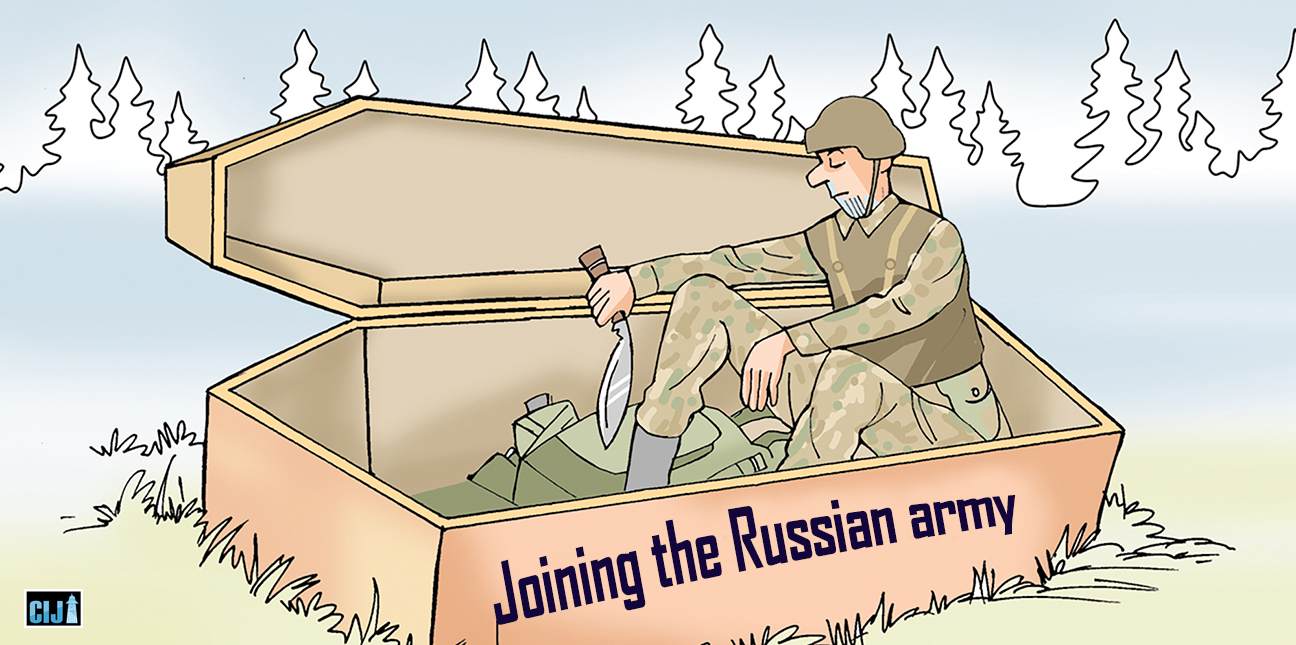
Nim Bahadur Kunwar, also known as Sushant, and Mohan Oli, both from Salyan, used to live near Khakendra’s rented room. The two incited him to better fly to Russia for a ‘lucrative’ job rather than bearing the hassles of trying for Korea. They lured him with promises of a monthly salary of Rs. 300,000 in Russia and a Russian citizenship after a year. Another of their acquaintances Ganesh Neupane went a step ahead and declared that the angling for the ‘Korean dream’ was a waste of time and money.
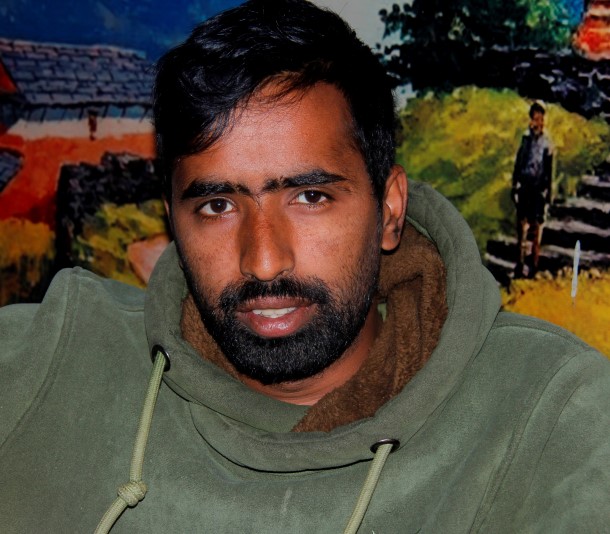
Khakendra Khatri, who managed to escape from the Russian army’s encampment and return to Nepal.
Previously, in Bhadra last year, Sushant and Mohan had already sent one Abhisek Budha of Nuwagaun in Rolpa to Russia. They arranged for a virtual meeting between Khakendra and Abhisek, who was recruited in the Russian army but hadn’t yet gone to the battlefield. Abhisek, too, encouraged Khakendra to join the Russian army. The Nepal government has now confirmed that Abhisek died while fighting the Ukrainian army.
According to Nepali youths who managed to escape from the Russian army, Mohan Oli’s relative Raj Oli, who is also from Chhatreshwari in Salyan, lives in Russia. He has married a woman working in the Russian army.
These two brothers have colluded to send desperate Nepali youths to the Russian army. They provide false assurances and collect hefty sums from the youths.
One of Khakendra’s relatives Dal Bahadur Oli, from Gangadev in Rolpa, also went to Russia by paying Rs. 700,000 to Mohan Oli. Along with him, Tara Gharti from Damachaur in Salyan also went to Russia. According to his family, Tara has already died in war after receiving bullets from Ukrainian soldiers.
Khakendra and Dal Bahadur, who reached Russia on October 17 last year, returned to Nepal through Azerbaijan Airlines via New Delhi on November 2. Dal Bahadur is currently doing a menial job in India’s Himachal state while Khakendra is trying to go to another country for work by taking back the money he paid to the agent.
To get recruited in the Russian army, Khakendra and Dal Bahadur had paid Rs. 300,000 each to Mohan Oli and had deposited the rest of the amount to the bank accounts of Nim Bahadur Kunwar and Ganesh Neupane (see picture of the bank receipt). They got their visas ten days after they paid the money. They reached Moscow two days after they left Kathmandu via Dubai.
At the Tribhuvan International Airport, they met five more people who hailed from Dhading, Salyan and Rolpa, and were also heading to Russia. By the time they reached Dubai, the group had expanded to 52 people. Unaware of the perils of the active war zone, the Nepali youths were excited.
While the agents took all others to the recruitment centre after they reached Moscow, they kept Khakendra at another hotel for two days on the pretext that he had yet to pay Rs. 50,000. Khakendra paid the amount and was taken to the recruitment centre, where he saw as many as 150 youths ready to enlist in the army.
Khakendra was asked to sign a document there. The contract letter, which Khakendra translated from Russian through Google, said that he was being recruited under ‘Group Seven Batallion’. But unlike what he was promised, it had no mention of the provision that he’d get Rs. 10 million in case he dies or gets injured.
Amid uncertainty, they were taken to a training centre, which was a day’s bus ride away. Even though they were told that they’d be sent to the battle after a six-month training, they had to go to war after learning to use a drone and a gun for just two weeks. And the task they had in hand was to capture the bunkers and squads of Ukrainian soldiers.
By this time, Khakendra had already joined the WhatsApp group of Group Seven Batallion. In the group, the Nepalis who had fought the war before him had posted harrowing photos and videos of dead and decapitated soldiers, and Khakendra had a change of heart.
After knowing that there was no possibility he could return after going to the war, he began to search for a way out of there. He paid the 17,000 rubles (around Rs. 26,000) that he had to the commander as bribe, told him that he had to visit a sick family member, and managed to get out of the barrack on the evening of October 29.
As he was walking on the road in the dead of the night, he saw a taxi. He asked for the taxi driver’s help through Google Translate and reached Moscow after a 14-hour trip. Since he had no money, he asked for an Azerbaizan Airlines ticket from Nepal and returned back home.
Khakendra says that he now has to take back the Rs. 700,000 he paid to Sushant and Mohan anyhow. That’s why, he had gone to Nepalgunj to meet Sushant on the pretext that he had his friends interested to go to Russia.
After he asked Sushant for his money back, Khakendra was handed over a bank cheque. But the account had no money. Now Sushant is on the run. “I have filed a complaint with the police charging him of banking fraud and human trafficking,” Khakendra said. “But he is yet to get arrested.”
The human trafficking racket
The victims’ statements reveal that there is a large network of traffickers swindling unemployed youths out of millions of rupees by promising them a lucrative job in the Russian army.
The Centre for Investigative Journalism talked to over a dozen Nepali youths who escaped from the Russian army’s encampments. They said that they had paid agents anywhere between Rs. 700,000 to Rs. 1 million to get enlisted in the Russian army.
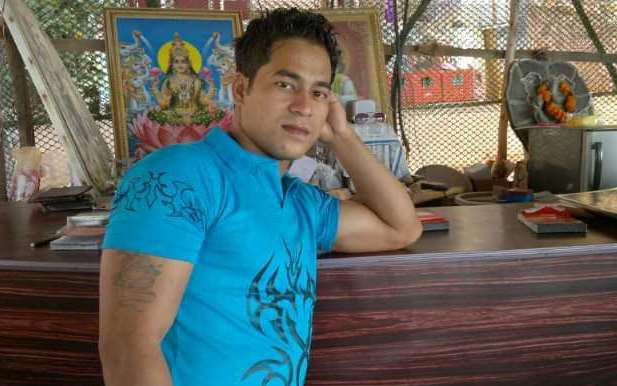
Mohan Oli
According to them, since Nepalis are sent to the frontlines of the war without adequate training, they had not even a 5 percent chance of returning back unscathed. Since Nepal and Russia have no military agreement, the injured Nepali soldiers do not get any compensation and the families of the dead cannot even collect the dead body.
Nearly 100 Nepalis like Khakendra have escaped from the Russian army, from the jaws of death. But one Ram Kumar Pradhan from Thaha Municipality in Makwanpur has gone out of contact in the Ukrainian land.
Before he went to Russia, Ram Kumar was with the Nepal Army. He had a hard time supporting his family with the little income he made. After his mother died in 2064 BS, he left the Nepal Army job. He remained unemployed and his house collapsed in the earthquake of 2015 (2072 BS), adding salt to his wound. It was after he saw no prospects of a better economic condition that Ram Kumar took out a loan and paid agents Rs. 800,000 to go to Russia in Asar last year.
His brother Babukaji says that officials at the Tripureshwar-based consular department have said Ram Kumar died during the war in Ukraine.
Ram Kumar has been out of contact for nine months. He had a conversation with his brother Babukaji two days before he was being sent to the battle. “I am being taken to the battle on October 16. I don’t know what will happen. I will call you after I return,” Babukaji recalls Ram Kumar as saying. Ram Kumar had also sent a photo of him donning combat dress.
“He went just for money, depending on the agent,” Babukaji says. “They say he has already died but the government has provided no proof.”
According to Babukaji, one DB Gurung had also left for Russia with Ram Kumar. But after they reached Qatar, the immigration office there had returned him home. On a second attempt, DB was returned from the immigration office in Russia.
As DB Gurung told the Pradhan family, agent Navaraj KC and manpower owner Suraj Thapa had colluded to send them to Russia.
Ram Kumar’s family has said that he paid Rs. 800,000 to Suraj. The travel company New Nepal Education World had prepared the tickets for them. According to the victim’s family, Navaraj and Suraj are currently in hiding in India. The owner of the travel company is also out of contact.
Babukaji himself requested the travel company to prepare a ticket for him to go to Russia. The officials at the company were interested but the owner Suraj Thapa was not there. Meanwhile, when Babukaji contacted Navaraj on WhatsApp, he said that he had only arranged the ticket for Ram Kumar.
“We talked once but he is not reachable on WhatsApp since then,” Babukaji said.
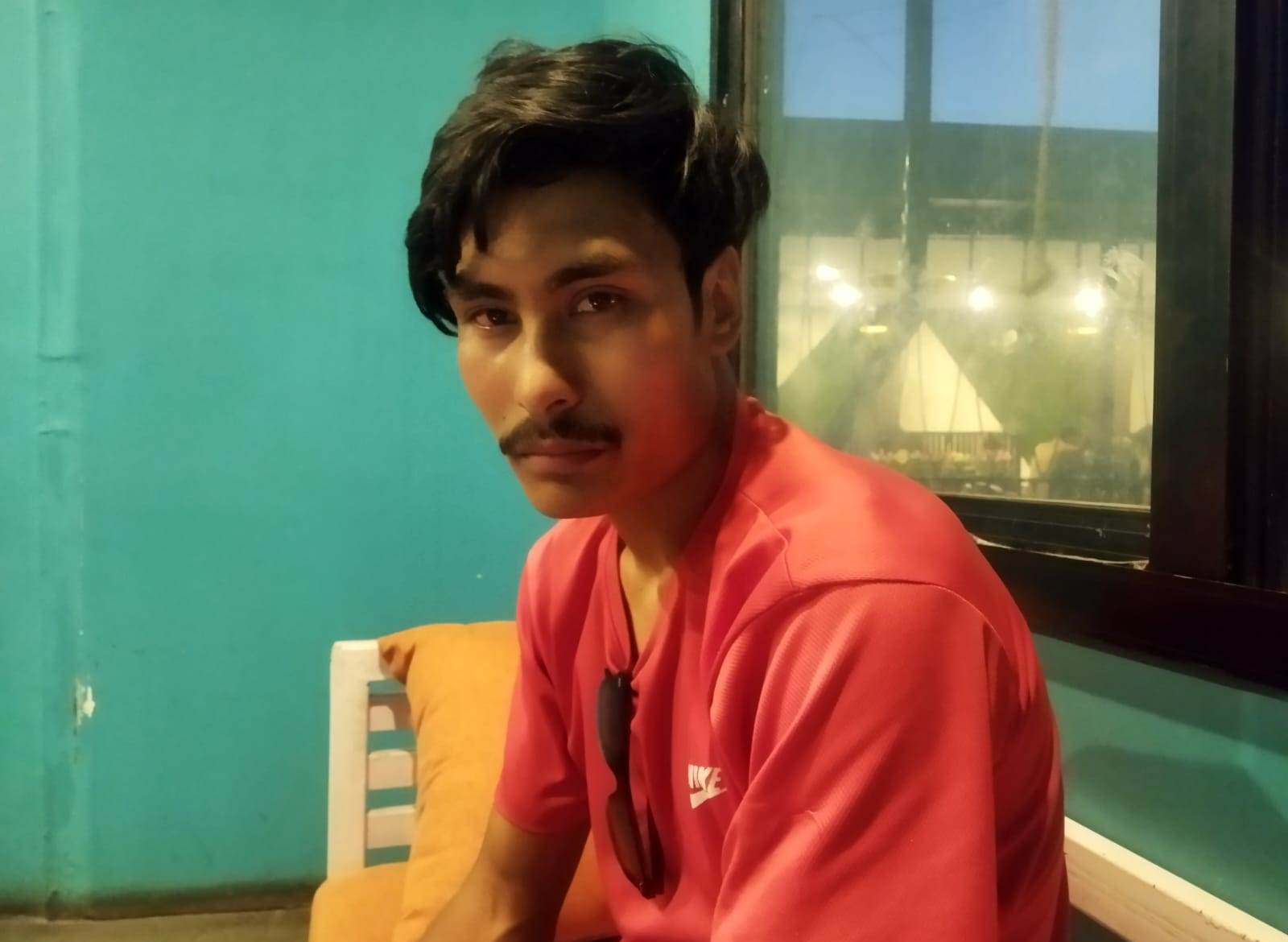
Babukaji Pradhan, the younger brother of Ram Kumar Pradhan, who was killed while fighting the war against Ukraine.
Tirtharaj Pandey, a retiree from Nepal Army, had come to Kathmandu from Surkhet after knowing that there was a job vacancy in the Royal Guard, Dubai. He had come to Kathmandu in Baisakh last year and he used to spend his time at Burger House in Gongabu.
There, he got close to one Kuber Karki from Dhading. “Instead of Dubai, aim for Russia,” Kuber told him. “I will arrange it for you. A three-lakh monthly income, Russian citizenship and a passport in the future.”
Tirtharaj got interested. He paid Rs. 650,000 to Raj Oli of Chhatreshwari in Salyan and flew to Moscow via Dubai within just a week, on September 30. There, a Russian citizen Alex had to come to pick him up at the airport. Once he reached the training centre on October 3, he was handed a 22-page contract letter. Tirthraj was shocked as there was no mention of the provisions of benefits that the agents had promised him.
The Indian agents there warned Tirtharaj that if he didn’t sign the document, the Russian government would put him in jail for up to 15 years. But Tirtharaj didn’t sign the document. “I told them, ‘Put me in jail if you will but I will not move ahead’,” Tirtharaj recalls. “Maybe because they thought other youths wouldn’t agree to enlist because of me, they let me go.”
Tirtharaj had to spend an extra Rs. 400,000 to get back to Nepal from Moscow. While Raj Oli said that he would return Rs. 350,000 of Tirtharaj’s amount, he then got out of contact.
“If I message him, he says he is in Delhi sometimes and other times, somewhere else,” says Tirtharaj, who was employed as a security guard to then education minister Devendra Raj Poudel for nine months. “I faced many hardships while trying to get to Russia.”
No record of the dead and the disappeared
According to records provided by the campaign to ‘save Nepalis in the Russian army’, as many as 49 Nepalis have died while fighting the Ukraine war so far; 41 others are believed to be dead but aren’t officially confirmed yet. According to the information provided by Nepalis serving in the Russian army, many families have already performed the final rites for the dead even if the dead bodies are yet to be repatriated.
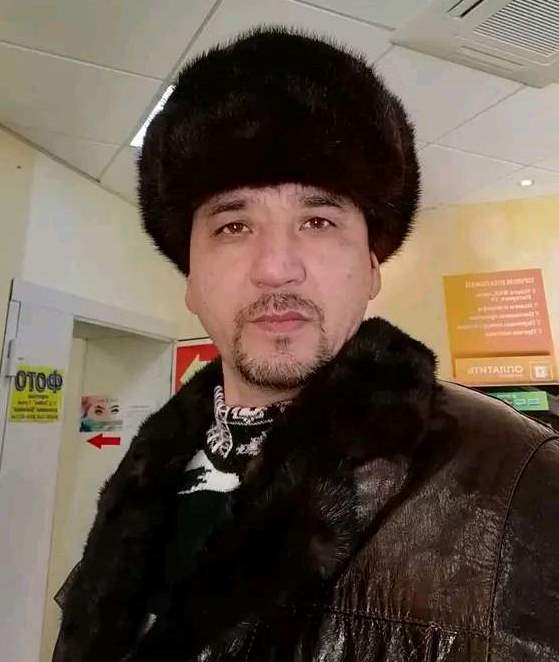
Raj Oli, who is allegedly involved in trafficking Nepali youths to Russia.
The campaign has collected the details of the families of 991 Nepali youths who enlisted in the Russian army until Baisakh 2081. According to which, as many as 127 Nepali youths who were injured in the war are currently undergoing treatment at various Russian hospitals. As many as 272 are out of contact for over eight months.
According to Prakash Mani Paudel, the director general of the consular service department under the foreign ministry, as many as 110 Nepalis who escaped the Russian army and reached Moscow have been returned to Nepal officially.
According to the Nepali youths who have returned, even though the barracks of the Russian army that recruits Nepalis look organised and well-managed, the frontline of the war is ill-managed. The commanders who have received training stay far from the frontlines and monitor them. Prisoners serving time are usually sent to the frontlines as commanders and they threaten, harass and torture Nepalis.
If Russian citizens serving time for offences like murder, rape and theft agree to fight the war for a year, they get pardon. They can then return to their home if they come out of the war alive. They get pardons even if they commit further offences in the society and are instead worshipped as war heroes.
Colluding for the illicit business
According to Nepali law, enlistment in the armies of any country other than India and the UK is illegal. After the Indian government floated the controversial Agneepath scheme in June, 2022, the enlistment of Nepalis in the Indian army is currently put on hold.
After Russia attacked Ukraine and began the war over two and a half years ago, the Russian President Vladimir Putin opened the way for foreign citizens to enlist in his country’s army. He announced attractive salary scales, provisions of Russian citizenship and passport, and boarding facilities. Following the announcement, many youths who were in Russia to study began enlisting in the army.
They were trained to use weapons and drones for two weeks, and were ordered to upload their videos in combat dress on social media, including TikTok. Many Nepali youths back home were keeping tabs on the developments, and when they saw the videos, they were getting curious. It was then the agents started hatching plans to send Nepalis to the Russian army. They began to send Nepali youths to Moscow on visit visas.
“My husband was working as a cook in Dubai after leaving the Nepal Army job,” said Deepa Singh Shahi, wife of Nabeen Shahi, who was killed in the Russia-Ukraine war. “Then he got in touch with one of the agents. He went to Russia and died in the war. Who do I appeal to now? We have asked for compensation from the government but it has paid no heed so far.”
Many other Nepalis who had left jobs back home to enlist in the Russian army too began to promote Putin’s announcements. The Nepalis were ordered by the Russian army commanders to upload videos of themselves in combat dress. They promoted their job in the Russian army as a lucrative and attractive one. Many Nepali youths got curious and began to search for a way to get to Russia.
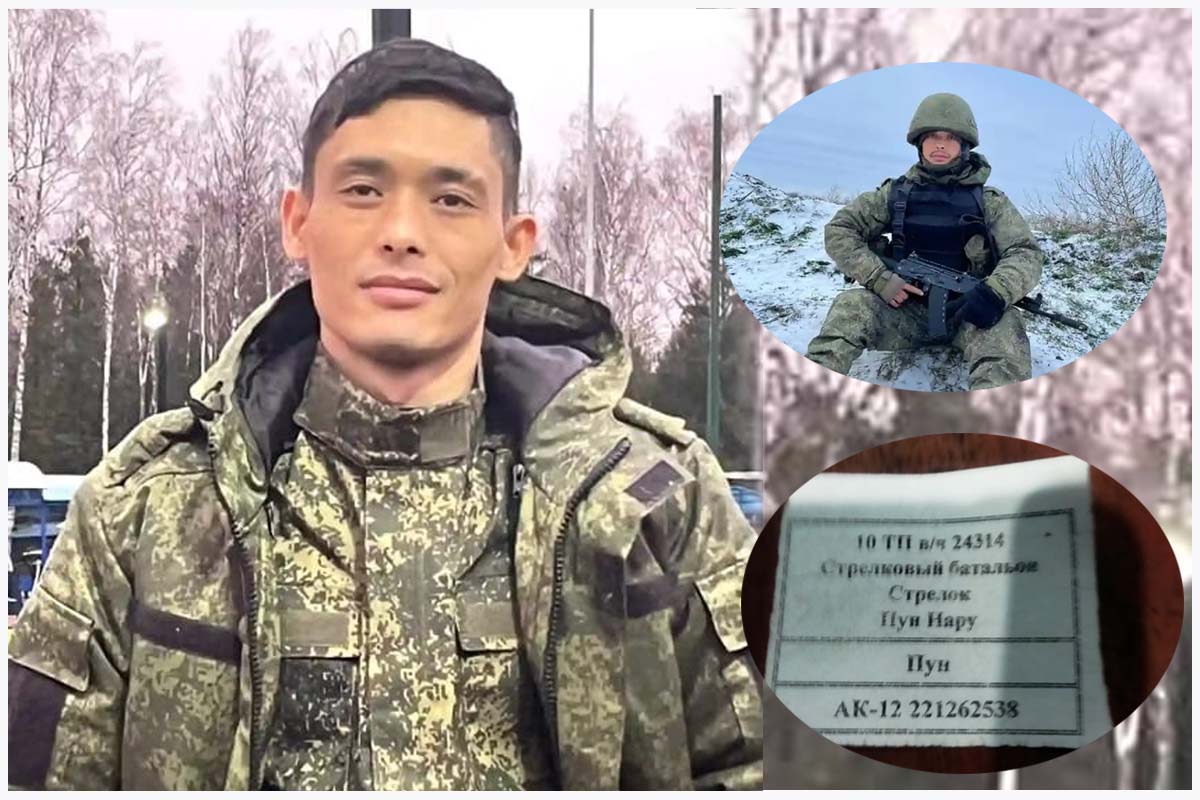
Nabeen Shahi pictured in combat dress (above) and his identity card.
“I had paid Rs. 800,000 to go to Russia. And I spent Rs. 300,000 while returning,” said Krishna Bahadur Shahi of Dailekh. Shahi had retired from Nepal Army and was interested in the Russian job after seeing videos of his villages Tularam Adhikari and Durga Paudel. He had then paid agents the money and set off for Russia.
Krishna Bahadur received four bullets in left hand and two in right thigh that were recently pulled out. He has bullet wounds all over his body. Krishna Bahadur, who had paid the agent Khem Sunar Rs. 800,000, is now hopelessly in debt and is searching for the agent to get his money back.
After the news began to circulate about the deaths of Nepalis serving in the Russian army, Nepal’s foreign minister Narayan Kaji Shrestha held a phone conversation with his Russian counterpart Sergey Lavrov on March 6. Shrestha had requested Lavrov to scrap the contracts of the Nepali youths and to provide compensation to the dead and injured, according to a statement released by Nepal’s foreign ministry then.
Arjun Bahadur Rai, spokesperson of the foreign ministry, said that the talks between the two foreign ministers haven’t yielded any results. “After they listened to us, they had raised concerns about the modalities of implementation, but it hasn’t yielded any results yet,” Rai said.
Meanwhile, the Nepal government appears indifferent to identifying the traffickers who are sending Nepali youths to the Russian army and punishing them.
“Many agents have already fled abroad,” Kritu Bhandari, the coordinator of the campaign to save Nepalis in the Russian army, says. “The police haven’t prioritised punishing those who are still here.”

Deepa Singh Shahi, wife of Nabeen Shahi, who was killed in the war.
After the Nepalis in the Russian army began to be deployed in the frontlines, the number of those dying, getting injured and pleading for help to return home is on the rise.
Bhandari, who was working towards the rights of Nepali women trafficked to the gulf, got involved in the campaign to save Nepalis in the Russian army after their plights got ignored.
Bhandari complains that even though they submitted the names of 61 agents involved in trafficking Nepalis to Russia to Home Minister Rabi Lamichhane on April 5, no steps have been taken to punish them so far.
Based on that list, the police had arrested as many as 22 manpower owners, travel agency owners and some former soldiers. “But they were let go of,” Bhandari said. “Some are made to pay back the money but none have faced further punishment.”
Gautam Mishra, a superintendent of police who is the director of the Nepal Police’s human trafficking investigation bureau, said that most Nepalis reaching Russia have used Dubai as the transit point. “Many have been working as agents after they started serving the army, while many others have already been killed,” Mishra says. “We are investigating the racket involved in this.”
Meanwhile, as many as 22 families have filed an application with the police to search for their missing family members who joined the Russian army. Two of them have been killed, according to other Nepalis in the Russian army. One of those who was previously out of contact has now returned home.
“Previously, we only got applications for rescue, so we couldn’t move ahead for punishment,” SP Mishra said. “But now we have also received complaints so the punishment process has also moved ahead. We expect to see its results in a few days.”
In the third week of Mangsir, as many as 12 people including the operator of an education consultancy office were arrested on the charge of trafficking Nepalis to Moscow. Of them were Hari BK, a retiree from Nepal Army, and Sujata Dahal and Ishwar Adhikari. All of them were immediately released.
Even though cases were filed at the Kathmandu District Court against four of them, the court gave a clean chit to the accused citing insufficient evidence against them.
Bhandari says that the traffickers have been given clean chit on the back of their political influence.



